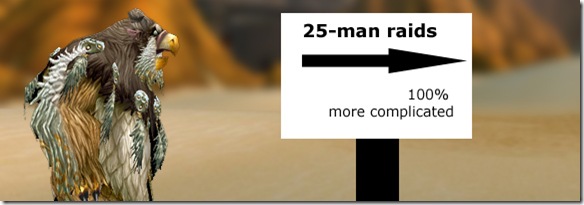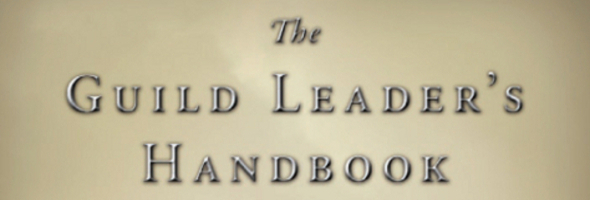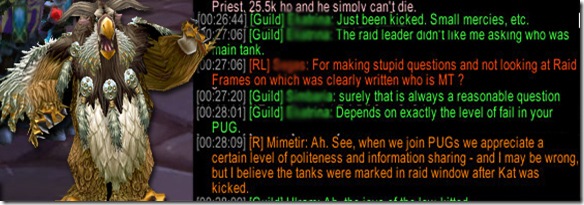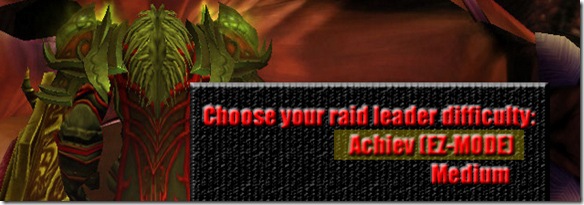
My guild is special. No, really. We’re like a guerrilla force descending from our airborne stronghold to plunge deep behind enemy lines in a surprise raid. This is, you see, an affectionate way of describing my guild’s raids.
We are a small, ten-strong band of fighters not all wearing the same colours because our roots are in a small core relying on PUGgers. It is sometimes a surprise when our raids get going, even though they’re organised in advance. Yet despite these things we’ve managed to storm the citadel right up to Rotface. Not only that, we’re thinking to scale up to 25 man operations. How I hear you cry, is that special?
My guild, you understand, is not a raiding guild. At least that’s what we keep telling ourselves. Herding Cats is a small group of real life friends. But many moons ago we got together, grabbed a few random PUGgers, and poked our noses into Naxxramas, like guilds do. Northrend’s raids became second homes over the months.
In ye olde Naxx runs we decided we just wanted PUGgers to be friendly. Not imbah, not a great tactician, not rocking 18k DPS. Our raids might not be lightning fast but they should be jolly good fun, old chap. Whenever we found a friendly stranger we rejoiced. And kidnapped them. Oh, we didn’t recruit – only invited them to our raids. In this way we cultivated a network of friendly people who fit in with the raiding group.
Our network of non-guildies quickly outgrew the slots we had for 10 man raiding and priority was given to people who were already raiding with us. We thought it sensible to develop a core. Tactically the group would become a single unit capable of learning encounters and to work together in order to move forward. Naturally this had social benefits for our raid members, who were rewarded with progression, loot and group friendships.
The downside of this was that many Herding friends are left out. As the raid leader/organiser, I really feel bad about this downside, as we are lucky enough to have people ask every week if there’s a raid spot for them this week even though they’re often told “I’m sorry but we’re full at the moment.”
So my guild is special but not unique. I’d wager there are a lot of guilds either already in our position or considering adapting to something like it.
How can we include people? 25 mans. Our network is big enough to fill 15-20 slots of a 25 man raid. It’s one huge step for Herding-kind. Dangerous almost. It might bite. Going into the hydra’s den unprepared is a bad idea so we’re arming ourselves and going at it as a team. We’re still thinking about it but this is the current battle plan.
1. Delegation. There are a lot of hats to wear in a 25 man so we’ve agreed to split the hats between the five of us. We’ll have leaders for each role, and they will each have a chat channel to communicate with their players. For example, in the tanks channel the tank leader will ascribe tactics to the tanks and foster communication between them. The other leaders will do the same for healers and melee and ranged DPS. The raid leader’s task is to introduce the raid, keep an eye on the group chat channels, be the deciding force in conflicts and handle unforeseen shenanigans. We’ll also have someone acting as a mentor. Unofficially we’ll have someone else as a morale officer and someone acting as a raid HR department.
2. Housekeeping. This is a brief introduction to the raid, given by the raid leader, which sets out a few basic points. These include our core principles for the run – for example, that we will welcome people amicably and expect them to do the same in return. We’ll also set out other rules on behaviour, breaks, tactics and loot. I’ve spoken before about how important this is, and it can only get more important the more people you have to organise. Setting clear rules from the start creates a safe, fun raid for everyone, Herding Cats veteran or first-timer and gives everyone a fair warning of what’s expected of them before we start.
It relaxes strangers, too. I think that people can join PUG raids expecting an atmosphere of every man for himself; having to constantly defend their playing style, DPS, healing, gear, whatever. We’ve had PUGgers say they’re pleasantly surprised to find a group where this isn’t the prevailing culture.
3. Communication. I believe the more information you communicate the more time you’ll save on wipes. Tactics are fluid things, changeable in progression content and per player experience. We’ll explain tactics for all encounters, provide a chance for suggestions and encourage raiders to ask questions in chat or privately to raid officers at any time. Officers will also keep an eye on their players and have a quiet chat if they suspect a player isn’t clear on something. “Hello Mr.. rogue, nice work on adherents there but you didn’t seem to get any time stabbing Deathwhisper. Any questions about that?” Likewise, we’ll check in with random raiders at random times to find out how they’re feeling.
Communication is most important when things go wrong. When we wipe we have a quick brainstorm in Herding Cats Land. Then we talk to the raid, saying something like “ok, what went wrong there was a deformed fanatic getting loose as phase 2 started. Easy mistake, we’ll get it right this time. Oh, and nice work on her mana shield, guys.”
4. Social. I play this game for fun, don’t know about you. It’s not a single player game and I like interacting with other people. I hope our raiders do too, but in a large group it’s easy for negativity to spread. The morale officer will keep the atmosphere cheery. The mentor’s role is just as important. It’s his task to be there for anyone who’s in any way unsure or needing reassurance. They might be new to raiding, they might be unsure in group settings, they might still be learning their class (who isn’t?). We welcome new players – given the right encouragement they can turn out to be some of the most loyal and best you’ll find.
5. Networking. We can’t fill 25 spots off the bat. We rather like that. It means that we have room to do what we did way back in Naxx times: meet new people and kidnap them to our raids. This way our network will grow whenever we find a new person we like and the entire group will benefit both in raiding and social terms.
If we get a PUGger we don’t like? We call them ‘That Guy’. You know – the guy who backseat raid leads, continually pastes DPS meters, abuses other group members. The list can go on. Ideally we’ll have a very strict policy, backed up by the housekeeping which already informed people what standards we work by. Some people have different attitudes and expectations to raiding than what they find in our group: that’s fine, but if you join a group you go by their expectations.
If someone insults our group members or any Cat finds them annoying in some way, they’re out. Sorry. I don’t care if they’re saved for one raid lockout, I don’t care if they’re the leader of the server’s top raiding guild. I don’t care if they’re hitting 11k healing every fight. I’ll protect my own group over someone who’s just griefed the priest healer they know nothing about. I think this is the most controversial point of our game plan, particularly if we just find someone annoying.
So those are the basics of our arsenal. There are some finer points such as where to begin our venture: we’re thinking ToTC25 for the first raid. It’s relatively short and should be a good ground to help the raid find its feet and bond. Not only that but it should provide some folks with bits of kit for the real progression and leave everyone salivating over the prospect of more next time. We also have a raid spam addon tailor-made for our needs in the works.
And do we, the raid officers, know what we’re doing? Why, yes, old bean. We know the enemy lines and the guerrilla force we’re leading into the Lich King’s chambers.
What about you? Is your guild in a similar position, or considering something like this – are you worried it’ll be a lot more work than you have time for? Are you in a large guild that does in house runs? Are you a PUGger who wishes you did/did not come across more groups like this? Do you think leaning a bit towards carebearing is going to hold us back or benefit us in the long term (and what’s YOUR playing style)?






